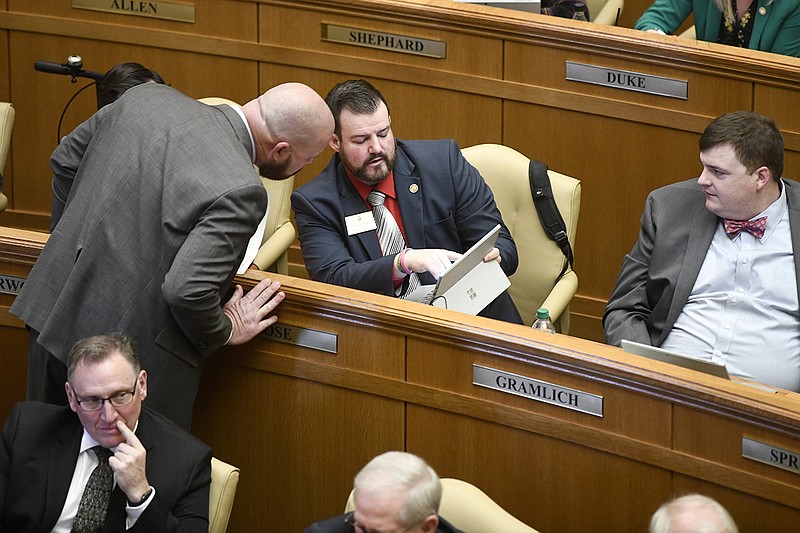The Arkansas House on Wednesday passed a bill intended to create a process for challenging books available to children in public and school libraries.
Senate Bill 81, which also would create an offense for "furnishing a harmful item to a minor" and strike a defense from state law intended to protect librarians from criminal prosecution under obscenity laws, received a vote of 56 to 25 with eight members voting present. The bill returns to the Senate for concurrence with a House amendment.
House sponsor Rep. Justin Gonzales, R-Okolona, said the bill would not "send all your librarians to jail" or create a list of banned books. For librarians to be prosecuted under the bill, Gonzales said they would have to knowingly distribute obscene material to children.
Critics have said the challenge process could lead to libraries and local elected officials being hampered by costly challenges. Those against the bill have said it would invest legislative bodies with judicial power and could disproportionally affect books written by and about LGBTQ people.
Parents who testified in favor of the bill have said it is needed to protect children from obscene material. Supporters also have contended more transparency is needed when it comes to decisions made by libraries on which books they carry.
SB81 would require libraries to form committees to review challenges to books. Sen. Dan Sullivan, R-Jonesboro, the bill's sponsor in the Senate, has said these committees would be subject to open meetings laws.
[DOCUMENT: Read the latest version of the library bill » arkansasonline.com/316sb81/]
Under the bill, people could appeal decisions made by these committees to a body of local elected officials. In the case of a school library, this body would be the school board. For a municipal or public library, appeals would go to the governing body of the county or city.
Rep. DeAnn Vaught, R-Horatio, spoke against the bill, saying libraries were already required to have written policies in place to consider challenged books. She worried the bill could lead to restrictions on the Bible. She pointed to other books including "The Catcher in the Rye" and the "Great Gatsby" that she was concerned could be restricted under the bill.
"I have lifelong Republicans asking me what are we doing down here," Vaught said. "I'm ready for us to start running good policy that moves Arkansas in a better direction as far as growing our economy and making our lives better."
Gonzales said officials would have to review books in their entirety when considering challenges. He contended freedom of religion guaranteed by the First Amendment of the U.S. Constitution would protect Bibles from being taken out of libraries.
Several lawmakers spoke in favor of the bill, saying it is needed to protect children. Rep. Stephen Meeks, R-Greenbrier, said he had found books available to children in a public library with explicit illustrations. Rep. Mary Bentley, R-Perryville, told lawmakers "we are in a culture war."
"We have been silent way too long," she said. "We have to stand up. Our kids are too important."
A provision of SB81 would allow libraries to disclose confidential library records to the parent or legal guardian of a minor.
Under the bill, a person who knowingly provides a child with an item that is "harmful to minors" would be guilty of a Class A misdemeanor. A person also could commit this offense by transmitting through direct internet communication an item that is "harmful to minors" to a person they believe to be a minor.
Among other characteristics, an item that is "harmful to minors" must be found by an average adult "applying contemporary community standards" to have a "predominant tendency to appeal to a prurient interest in sex to minors."
An average adult also must find the item depicts or describes "nudity, sexual conduct, sexual excitement or sadomasochistic abuse in a manner that is patently offensive to prevailing standards in the adult community with respect to what is suitable for minors."
The material or performance would have to lack "serious literary, scientific, medical, artistic or political value for minors."
